
How cytotoxic T cells get activated by MHC-I/antigen complexes and then proceed to kill infected cells
- Subject:
- Agriculture & Natural Science
- Biology
- Material Type:
- Lesson
- Provider:
- Khan Academy
- Author:
- Sal Khan
- Date Added:
- 09/22/2013

How cytotoxic T cells get activated by MHC-I/antigen complexes and then proceed to kill infected cells
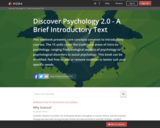
This textbook presents core concepts common to introductory courses. The 15 units cover the traditional areas of intro-to-psychology; ranging from biological aspects of psychology to psychological disorders to social psychology. This book can be modified: feel free to add or remove modules to better suit your specific needs.
This book includes a comprehensive instructor's manual, PowerPoint presentations, a test bank, reading anticipation guides, and adaptive student quizzes.

The NOBA Project is a growing collection of expert-authored, open-licensed modules in psychology, funded by the Diener Education Fund. From these open modules, Tori Kearns and Deborah Lee created an arranged open textbook for her introductory psychology class. This textbook was created under a Round One ALG Textbook Transformation Grant.
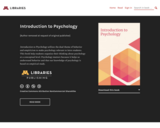
When you teach Introduction to Psychology, do you find it difficult — much harder than teaching classes in statistics or research methods? Do you easily give a lecture on the sympathetic nervous system, a lecture on Piaget, and a lecture on social cognition, but struggle with linking these topics together for the student? Do you feel like you are presenting a laundry list of research findings rather than an integrated set of principles and knowledge? Have you wondered how to ensure your course is relevant to your students? Introduction to Psychology utilizes the dual theme of behavior and empiricism to make psychology relevant to intro students. The author wrote this book to help students organize their thinking about psychology at a conceptual level. Five or ten years from now, he does not expect his students to remember the details of most of what he teaches them. However, he does hope that they will remember that psychology matters because it helps us understand behavior and that our knowledge of psychology is based on empirical study.
This is a derivative of INTRODUCTION TO PSYCHOLOGY by a publisher who has requested that they and the original author not receive attribution, which was originally released and is used under CC BY-NC-SA. This work, unless otherwise expressly stated, is licensed under a Creative Commons Attribution-NonCommercial-ShareAlike 4.0 International License.
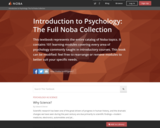
This textbook represents the entire catalog of Noba topics. It contains 90 learning modules covering every area of psychology commonly taught in introductory courses. This book can be modified: feel free to rearrange or remove modules to better suit your specific needs.Please note that the publisher requires you to login to access and download the textbooks.
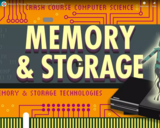
The video resource "Memory & Storage: Crash Course Computer Science #19" is included in the "Computer Science" course from the resources series of "Crash Course". Crash Course is a educational video series from John and Hank Green.
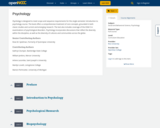
Psychology is designed to meet scope and sequence requirements for the single-semester introduction to psychology course. The book offers a comprehensive treatment of core concepts, grounded in both classic studies and current and emerging research. The text also includes coverage of the DSM-5 in examinations of psychological disorders. Psychology incorporates discussions that reflect the diversity within the discipline, as well as the diversity of cultures and communities across the globe.Senior Contributing AuthorsRose M. Spielman, Formerly of Quinnipiac UniversityContributing AuthorsKathryn Dumper, Bainbridge State CollegeWilliam Jenkins, Mercer UniversityArlene Lacombe, Saint Joseph's UniversityMarilyn Lovett, Livingstone CollegeMarion Perlmutter, University of Michigan


The Civil War, from 1861 to 1865, is the centerpiece of our nation's story. It looms large, not merely because of its brutality and scope but because of its place in the course of American history. The seeds of war were planted long before 1861 and the conflict remains part of our national memory. Geography has helped shape this narrative. The physical landscape influenced economic differences between the regions, the desire to expand into new territories, the execution of the conflict both in the field and on the home front, and the ways in which our recollections have been shaped. Maps enable us to present the complex strands that, when woven together, provide a detailed account of the causes and conduct of the war. These visual images remain a salient aspect of our memory. Photographs, prints, diaries, songs and letters enhance our ability to tell this story, when our nation, as a Currier & Ives cartoon depicts, was about to be "Torn in Two." This exhibition tells the story of the American Civil War both nationally and locally in Boston, Massachusetts, through maps, documents, letters, and other primary sources. This exhibition was developed by the Norman B. Leventhal Map Center, a nonprofit organization established as a partnership between the Boston Public Library and philanthropist Norman Leventhal.
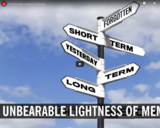
This resources is an online video available in the "World Science Festival" open education series. The video "The Unbearable Lightness of Memory" is included in the Biology section of the series.

This resources is an online video available in the "World Science Festival" open education series. The video "What Is Memory?" is included in the Biology section of the series.